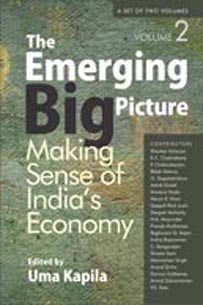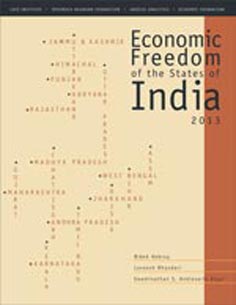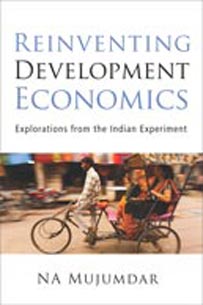Catalogue
›
‹
-
New Titles /1 of 3

Hard-cover • 2014
Pages: 416+368
ISBN 9789332701335
INR 1995
+ Add to Cart
Also available as e-book
Publisher:Academic Foundation
BrochureThe Emerging Big Picture
Making Sense of India's Economy : A set of 2 volumes
Uma Kapila (Ed.)
About the Book
<p>Indian economy is currently going through a difficult period. However, the problems are not unique to India. Growth has slowed down in many other emerging market and developing economies (EMDEs). This book entitled: “The Emerging Big Picture: Making Sense of India’s Economy”, in two volumes, comprising the writings of eminent economists, policy makers, distinguished scholars and subject experts, throws light on various reasons attributed to the growth slowdown and collectively provide roadmap for not only accelerating economic growth but also sustainable and regionally more inclusive growth. </p>
New Titles /2 of 3BrochureEconomic Freedom of the States of India 2013
Bibek Debroy‚ Laveesh Bhandari‚ Swaminathan S. Anklesaria Aiyar
About the Book
<p>Economic freedom matters. It improves outcomes by empowering citizens with the freedom to choose. This report, one of a series starting in 2005, once again seeks to measure economic freedom in different Indian states, and to show how this improves economic outcomes.</p> <p> </p> <p>Economic freedom is a concept first used by the Fraser Institute to measure the extent to which governments constrain efficient decision making and distort resource allocation. It has been used in cross-country literature to show that countries with higher levels of freedom have better development indicators. However, attempts to capture economic freedom at the sub-national level of state governments are rare, although very pertinent in a federal country like India. Many areas of economic decision making in India fall under the jurisdiction of state governments, and are listed in the Seventh Schedule of the Indian Constitution. Our pioneering work modifies the Fraser Institute’s methodology of measuring economic freedom across countries, creating a new way of measuring economic freedom across Indian states. This enables us to see which states are getting freer or less free, and to demonstrate how economic freedom at the state level impacts economic development.</p>
New Titles /3 of 3BrochureReinventing Development Economics
Explorations from the Indian Experiment
N.A. Mujumdar
About the Book
<p>The dimensions of development have now taken a new shape. There is no generic formula for growth and every country has specific characteristics and historical experiences that must be reflected in its growth story. It has now been widely recognised that inclusive growth is imperative for sustainability. Governments around the world are therefore anxious that even as they pursue economic growth they must make that growth process inclusive. The strong linkage between stability and inclusion should be the guiding principle of policies for promotion of growth. There is also a renewed call for revival of ethical values. </p> <p> </p> <p>The book is an attempt at exploring the new aspects of development philosophy. Divided into six broad sections, it addresses the issues of: growth and development, monetary policy, banking policy, fiscal policy, food security and global environment with reference to the Indian economy. The underlying main theme of all the articles in the volume is promoting growth which is all-round and inclusive, equitable and above all growth which ultimately leads to the emergence of value-based compassionate society.</p>








